Subjects we offer
Our content is sorted either by Achievement Standard - to cover NCEA requirements, or by Topic to allow any student to benefit no matter what course they are following, e.g. Cambridge, General Certificate of Secondary Education (GCSE), and International Baccalaureate (IB).
Currently we have content for the following subjects: Accounting, English, Maths, Science and Physics. Click on a year level to view a summary of the content we offer.
2020 Prices for English, Junior Maths, Science and Physics, Accounting.
Accounting
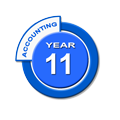
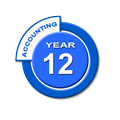
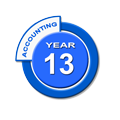
Year 11 / NCEA Level 1
20+ modules, 80+ pages of notes and 500+ questions.
Definitions
7 modules testing meanings of key terms in Year 11 Accounting.Achievement Standards Contents
-
AS 1.1 (90976) Demonstrate an understanding of accounting concepts for small entities
4 modules that help students to describe Accounting and Accounting concepts define and apply financial elements and analyse transactions. -
AS 1.2 (90977) Process financial transactions for a small entity
4 modules that help students to process financial transactions such as a cash receipts journal, a cash payments journal and a general ledger and trial balance. -
AS 1.3 (90978) Prepare financial statements for sole proprietors
3 modules that help students to prepare financial statements such as the income statement, balance sheet with balance day adjustments incorporated, and a cash budget. -
AS 1.4 (90979) Prepare financial information for a community organisation's annual general meeting
2 modules that help a student to prepare financial information for a community organisation's annual general meeting incorporating balance day adjustments. -
AS 1.5 (90980) Interpret accounting information for sole proprietors
2 modules that help students to analyse and interpret information for a sole proprietor. -
AS 1.6 (90981) Make a financial decision for an individual or group
2 modules that help students to prepare financial statements to support decision making and make a financial decision. -
Definitions
7 modules that allow students to test their recall of key terms and definitions.
Year 12 / NCEA Level 2
Revision (Year 11 work)
8 modules with relevant material from Level 1 AS 1.1, 1.3 and 1.5 (see above).Achievement Standard Contents
21 modules in addition to with relevant material from Level 1 AS 1.1, 1.3 and 1.5 (see above).-
AS 2.1 (91174) Demonstrate understanding of accounting concepts for an entity that operates accounting subsystems
4 modules that cover financial elements and historical costs, functions of accounting, qualitative characteristics, capital and revenue expenditure, and depreciation. -
AS 2.3 (91176) Prepare financial information for an entity that operates accounting subsystems
8 modules covering balance day adjustments, closing account entries, preparing an income statement, statement of financial position, notes to the statement, preparing a cash flow for a sole proprietor and preparing financial statements for a trading entity. -
AS 2.4 (91177) Interpret accounting information for entities that operate accounting subsystems
5 modules covering analysis and interpretation of financial statements: profitability, liquidity, financial stability and management effectiveness and making justified recommendations. -
AS 2.6 (91179) Demonstrate understanding of an accounts receivable subsystem for an entity
2 modules covering accounts receivable: subsidiary ledgers and control accounts, and processing financial information for the accounts receivable sub-system. -
AS 2.7 (91386) Demonstrate understanding of an inventory subsystem for an entity
2 modules covering inventory systems, preparing accounting entries and inventory systems.
Year 13 / NCEA Level 3
Material is being progressively added to this subject.
Revision (Year 12 work)
4 modules with relevant material from Level 2.Achievement Standard Contents
20+ modules, 80+ pages of notes and 600+ questions.-
AS 3.1 (91404) Demonstrate an understanding of accounting concepts for a New Zealand Reporting entity
-
AS 3.2 (91405) Demonstrate understanding of accounting for partnerships
5 modules covering partnerships, partnership law, journals and ledgers, financial statements with supplementary and applied questions. -
AS 3.3 (91406) Demonstrate understanding of company financial statements preparation
8 modules covering income statments, statements of financial positions, dividends, assets, cash flows etc.
English
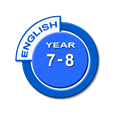
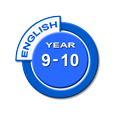
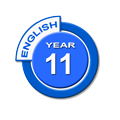
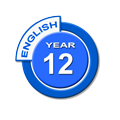
Years 7 - 8
100+ modules grouped under topics with approximately 140 pages of information, 2000+ questions and explanations pitched at Levels 3 and 4 of the New Zealand Curriculum.
Topic Contents (NZC Level 3-4)
-
Close Reading of an Unfamiliar Text
33 modules (Levels 3-4) that provide students with opportunity to read closely, to show their understanding of ideas and meanings, word classes and language features in a range of authentic texts. -
Language Features and Poetic Devices
6 modules that explain and provide focused practice for students in recognising poetic devices used commonly in poetry. -
Punctuation
5 modules provide information and practice in accurate punctuation. -
Sentence Structure
3 modules that teach students the main type of sentences -
Spelling
8 modules focus on common 'rules' of spelling. Lists of useful vocabulary and subject specific terms will be added over time. -
Vocabulary Development
50+ modules covering confusing words/homophones, prefixes and suffixes. There also some that ask students to think about expanding their vocabulary in order to make their writing more vivid. -
Word Classes
16 modules provide information and practice in recognising the different parts of speech.
Years 9 - 10
Workbooks
This subject is supported by two write-on workbooks with notes and exercises:-
Arranging Words
40 pages covering punctuation, word classes and sentence structure. -
Working with Words
60 pages covering background to writing, the history of the English language, poetic devices and language features, close reading.
eLearning
170+ modules with approximately 250 pages of information, 2000+ questions and explanations pitched at Levels 4 and 5 of the New Zealand Curriculum. This subject is supported by two write-on workbooks with notes and exercises:Topic Contents (NZC Level 4-5)
-
Background to Writing and Formal Writing
9 modules covering a range of aspects of writing including recognising formal and informal writing, fact and opinion, the literary essay and letters to the editor. -
Close Reading of an Unfamiliar Text
58+ modules (Levels 3-6) that provide students with opportunity to read closely, to show their understanding of ideas and meanings, word classes and language features in a range of authentic texts. -
Derivations - The History of the English Language
19 modules assist students to explore aspects of the development of the English language over a thousand years. Students will enjoy learning about earlier forms of the language and discover where words have come from. A dictionary with derivations will be helpful but not essential. -
Exemplars
6 exemplars of student writing. -
Language Features and Poetic Devices
15 modules that explain and provide focused practice for students in recognising and commenting on the effect of common language features and poetic devices. -
Punctuation
5 modules provide information and practice in accurate punctuation. -
Response to Text
3 modules that relate to creative texts. -
Sentence Structure
5 modules relating to aspects of different sentence types. -
Spelling
8 modules focus on common 'rules' of spelling. Lists of useful vocabulary and subject specific terms will be added over time. -
Vocabulary Development
16 modules cover confusing words/homophones, prefixes and suffixes, and include some that ask students to think about expanding their vocabulary in order to make their writing more vivid. -
Word Classes
7 modules provide information and practice in recognising the different parts of speech.
Year 11 / NCEA Level 1
Workbook
This subject is supported by a write-on workbook:-
AS 1.3 (90851) Unfamiliar Text
40 pages and 16 passages of non fiction, fiction and poetry extracts with NCEA style questions.
eLearning
130+ modules with approximately 260 pages of information, 3600+ questions and explanations.-
Basic Revision Skills
18 modules revising knowledge and use of word classes and punctuation. -
Definitions
8 modules testing meanings of key terms in Year 11 English.
Achievement Standards Contents
-
AS1.1 (90849) Show understanding of specified aspects of studied written texts
16 modules that explore the key features of extended texts, short stories and poetry and provide exemplars of student work for analysis. -
AS1.2 (90850) Show understanding of specified aspects of studied visual or oral texts
7 modules that explore the key features of film and provide exemplars of student work for analysis. -
AS1.3 (90851) Show understanding of significant aspects of unfamiliar written text(s) through close reading
19 modules that provide students with opportunity to read closely, to show their understanding of and comment on the language features in a range of authentic written texts from NZ and elsewhere.- Language Features: 11 modules that explain and provide focused practice for students in recognising and commenting on the effect of common language features.
- Poetic Devices: 7 modules that explain and provide focused practice for students in recognising and commenting on the effect of common devices of poetic writing.
- Sentence Structure (Syntax): 6 modules that require students to recognise key aspects of sentence structure.
-
AS1.4 (90052) Produce creative writing
4 modules reviewing key elements including structure creative writing.- Making Writing Vivid: 8 modules that provide students with a practical focus on the meanings and forms of words to make their writing more vivid.
-
AS1.5 (90053) Produce formal writing
5 modules that look at how to write paragraph and essay answers.- Background to Writing: 6 modules that review aspects of style, register and levels of formality.
- Making Writing Accurate: 16 modules that focus on accurate use of language.
-
AS1.6 (90857) Construct and deliver an oral text
3 modules that explore the key features of speech-making and provide exemplars of student work for analysis. -
AS1.7 (90855) Create a visual text
5 modules that provide opportunities for analysis of actual advertisements.
Year 12 / NCEA Level 2
Workbook
This subject is supported by a write-on workbook:-
AS 2.3 (91900) Unfamiliar Text
44 pages and 16 passages of opinion, fiction and poetry extracts with NCEA style questions.
eLearning
70 modules plus 79 Year 11 revision modules with approximately 300 pages of information, 4500 questions and explanations.-
Basic Revision Skills
- 30 modules revising knowledge and use of word classes, punctuation and confusing words.
-
Definitions
- 12 modules testing meanings of key terms in Year 11 and 12 English.
Achievement Standards Contents
-
AS 2.1 (91098) Analyse specified aspect(s) of studied written text(s), supported by evidence
12 modules that explore the key features of extended texts, poetry, short stories; provide some revision material on Shakespeare including a plot test on Macbeth; analyse exemplars of student work. -
AS 2.2 (91099) Analyse specified aspect(s) of studied visual or oral text(s), supported by evidence
4 modules that explore the key features of film and analyse an exemplar of student work.- Revision: 3 Year 11 revision modules.
-
AS 2.3 (91100) Analyse significant aspects of unfamiliar written text(s) through close reading, supported by evidence
23 modules that provide students with an opportunity to read closely, and analyse the ideas and language features in a range of authentic written, oral and visual texts.- Revision: 20+ Year 11 reading comprehension passages have been added to support this important skill.
- Language Features: 11 revision modules designed to help students recognise and analyse the effect of common language features.
- Poetic Devices: 7 revision modules designed to help students recognise and analyse the effect of common devices of poetic writing.
-
AS 2.4 (91101) Produce a selection of crafted and controlled creative writing
4 modules reviewing the key elements of creative writing plus a student exemplar for analysis.- Revision: 7 modules of work from Year 11 are included to provide supplementary material.
- Making Writing Vivid: 6 modules that provide students with a focus on expanding vocabulary to make their writing more vivid.
-
AS 2.4 (91101) Produce a selection of crafted and controlled formal Writing
5 modules that look at how to write paragraph answers, a Beyond the Text essay and a film review.- Revision: 3 modules of work from Year 11 revising spoken and written, formal and informal language, and how to write a speech and essay.
-
AS 2.8 (91105) Use information literacy skills to form developed conclusion(s)
11 modules assist students explore aspects of the development of the English language over a thousand years, the Language of Advertising, the Language of Oratory. -
AS 2.10 (91107) Analyse aspects of visual and/or oral text(s) through close viewing and/or listening, supported by evidence
7 famous speeches and questions to use as practice for this standard.
Maths
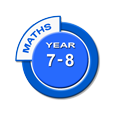
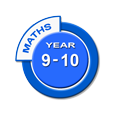
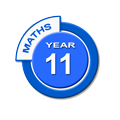
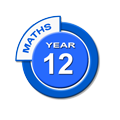
Years 7 - 8
50 modules covering the learning outcomes for Level 4 of the NZ Curriculum = 170 pages of information, pictures and diagrams = 2000 questions and explanations.
-
Topic Contents - (NZC Level 4)
- Algebra: 5 modules.
- Geometry: 10 modules.
- Measurement: 11 modules.
- Number: 19 modules.
- Statistics and Probability: 5 modules.
Years 9 - 10
87 modules: learning outcomes for Level 5 of the NZ Curriculum = 170+ pages of information, pictures and diagrams = 3400+ questions and explanations.
In Revision folders 50+ modules covering the learning outcomes for Level 4 of the NZ Curriculum = 170 pages of information, pictures and diagrams = 2000 questions and explanations.
In Revision folders 50+ modules covering the learning outcomes for Level 4 of the NZ Curriculum = 170 pages of information, pictures and diagrams = 2000 questions and explanations.
-
Definitions
- 5 modules testing the meanings of key terms in Year 10 Mathematics
-
Topic Contents - (NZC Level 5)
- Algebra: 20 modules.
- Geometry: 17 modules.
- Measurement: 13 modules.
- Number: 23 modules.
- Statistics: 14 modules.
Year 11 / NCEA Level 1
70 modules plus 83 Year 10 modules in Revision folders = 300+ pages of information, pictures and diagrams = 5000+ questions and explanations pitched at Level 6 of the curriculum.
-
Definitions
- 9 modules testing meanings of key terms in Year 10 and Year 11 Mathematics.
-
Extension
- 21 modules provide extension work in algebra, measurement and statistics as preparation for Year 12.
Achievement Standards Contents
-
AS 1.1 (91026) Apply numeric reasoning in solving problems
8 modules that equip students to classify and solve number problems. -
AS 1.2 (91027) Apply algebraic procedures in solving problems
8 modules enable students to practise the algebraic methods of substitution, forming and solving equations. -
AS 1.3 (91028) Investigate relationships between tables, equations and graphs
15 modules that enable students to generate patterns and graph functions etc. -
AS 1.4 (91029) Apply linear algebra in solving problems
15 modules that enable students to generate patterns and graph functions etc. -
AS 1.5 (91030) Apply measurement in solving problems
3 modules that enable students to apply measurement in solving problems. -
AS 1.6 (91031) and AS 1.7 Apply geometric reasoning and right-angled triangles in solving problems
6 modules that enable students to apply geometrical facts to discover length and angle size details from geometric designs, giving logical proof. -
AS 1.8 (91033) and AS 1.9 Apply knowledge of geometric representations and transformation geometry in solving problems
5 modules that enable students to combine transformations, interpret 2-D representations of 3-D objects, and explain negative scale factors. -
AS 1.10 (91035) and 1.11 Investigate a given multivariate data set using the statistical enquiry cycle
3 modules that help students to identify, record bi-variate data and make statements about variable relationships. -
AS 1.12 (91037) and AS 1.13 Demonstrate understanding of chance and data
5 modules that help students to demonstrate understanding of chance and data.
Year 12 / NCEA Level 2
116 modules plus 45 NCEA Level 1 revision modules = approximately 300 pages of information, pictures and diagrams = 5000 questions and explanations.
-
Definitions
- 11 modules testing meanings of key terms in Year 11 and Year 12 Mathematics.
-
Revision
- 45 modules meeting the learning outcomes for NZC level 6 and NCEA level 1 in algebra, geometry, measurement, number, and statistics.
Achievement Standards Contents
-
AS 2.1 (91256) Apply co-ordinate geometry methods in solving problems
12 modules that enable students to formulate coordinate geometry with straight line applications. -
AS 2.2 (91257) and AS 2.14 (91269) Apply graphical methods in solving problems/Apply systems of equations in solving problems
10 modules deal with creating or reading various standard curved graphs and transformations of them. -
AS 2.3 (91258) Apply sequences and series in solving problems
12 modules that advance skills with sequences and series and their applications. -
AS 2.4 (91259) Apply trigonometric relationships in solving problems
12 modules that introduce trigonometric equations, their graphs and solutions; and revise essential right-angled triangle applications, and the use of the Sine Rule and Cosine Formulae. -
AS 2.6 (91261) and AS 2.14 (91269) Apply algebraic methods in solving problems/Apply systems of equations in solving problems
22 modules that advance students' algebraic skill. -
AS 2.7 (91626) Apply calculus methods in solving problems
20 modules introduce differential calculus for polynomial and other simple power term expressions, with applications. -
AS 2.8 - AS 2.11 (91263-91266) Design a questionnaire, make an inference, conduct an experiment, evaluate a statistically based report
10 modules enable students to carry out appropriate statistical surveying, analysis and presentation techniques with their own project. -
AS 2.12 (91267) and AS 2.13 (91268) Apply probability methods in solving problems/Investigate a situation involving elements of chance using a simulation
6 modules that advance students' skills with experimental and theoretical probability.
Science

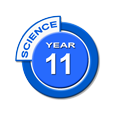
Years 9 - 10
31 modules covering the some of the knowledge and skills required at Levels 4 and 5 of the New Zealand Curriculum. Further material will be added progressively.
-
Topic Contents - (NZC Level 5)
- Astronomy: 7 modules.
- Introduction to Biology and Chemistry: 6 modules.
- Geology: 9 modules.
- Physics: 5 modules.
- Practical Investigations: 4 modules.
Year 11 / NCEA Level 1
Workbooks
This subject is supported by the following write-on workbooks:-
Science AS 1.1 (90940) Mechanics
70 pages of coloured diagrams, graded questions and answers, NCEA style questions covering topics such as: motion, mass and weight, kinetic and gravitational energy, pressure. -
Science AS 1.5 (90944) Acids and Bases
70 pages of coloured diagrams, graded questions and answers, NCEA style questions covering topics such as: atomic structure, ions, equations, acids, bases and indicators, reactions with metals. -
Science AS 1.9 (90948) Genetics
30 pages of coloured diagrams, graded questions and answers, NCEA style questions covering topics such as: cell division, variation and production, chromosomes, monohybrid crosses.
eLearning
80+ modules = approximately 150 pages of information, pictures and diagrams = 2500 questions and explanations.-
Definitions
- 19 modules testing meanings of key terms used in Year 11 Science.
-
Topic Contents
- Acids and Alkalis.
- Classification of Rocks.
- Electricity.
- Energy.
- Genetics.
- Metals.
- Micro-organisms.
- Motion and Force.
- Spatial Relationships within the Solar System.
- Simple Atomic Structure.
- Space Exploration.
Achievement Standards Contents
Living World (Biology):
-
Biology 1.3 (90927 External) Demonstrate understanding of biological ideas relating to micro-organisms
6 modules covering bacteria, micro-organisms, fungi and viruses. -
Science 1.9 (90948 External) Demonstrate understanding of biological ideas relating to genetic variation
4 modules covering cell division, chromosomes, genes, alleles DNA, and monohybrid crosses.
Material World (Chemistry):
-
Chemistry 1.3 (90932 External) Demonstrate understanding of aspects of carbon chemistry
4 modules covering covalent molecules of carbon; alkanes, alkenes and alcohols; properties of carbon compounds; production and uses of carbon compounds. -
Chemistry 1.4 (90933 External) Demonstrate understanding of aspects of selected elements
10 modules covering atomic structure, writing equations, physical properties of metals and their reactions, and non-metals. -
Chemistry 1.5 (90934 External) Demonstrate understanding of aspects of chemical reactions
10 modules covering atomic structure, ions, writing equations, combination reactions, decomposition reactions. -
Science 1.5 (90944 External) Demonstrate an understanding of aspects of acids and bases
17 modules covering atomic structure, ions, rates of reaction, writing equations, acids, bases and indicators, reactions of acid and metals. -
Science 1.7 (90946 Internal) Investigate the implications of the properties of metals to their use in society
5 modules covering the physical properties, uses and reactions of metals.
Physical World (Physics):
-
Physics 1.3 (AS90937) Demonstrate understanding of aspects of electricity and magnetism/Science 1.2 (90941 Internal) Investigate the implication of electricity and magnetism in everyday life
4 modules covering static electricity, voltage and current, circuits and their components, magnetism. -
Science 1.1 (90940 External) Demonstrate understanding of aspects of mechanics
9 modules covering motion, mass, balanced and unbalanced forces, energy and pressure. -
Science 1.4 (90943 Internal) Investigate the implication of heat in everyday life
2 modules covering heat capacity, latent heat and temperature.
Planet Earth and Beyond (Geology and Astronomy):
-
Science 1.13 (90952 Internal) Demonstrate understanding of the formation of surface features in New Zealand
9 modules provide students with opportunities to describe, explain and discuss the types and formation of igneous, metamorphic and sedimentary rocks. -
Science 1.15 (90954 Internal) Demonstrate understanding of the effect on planet Earth of astronomical cycles
2 modules examine the orbits of the planets and their moons and the scale of the solar system.
Also:
-
Practical Investigation Principles for Physics, Chemistry and Biology
4 modules that revise and apply the principles of investigations in biology, chemistry, and physics.
Physics
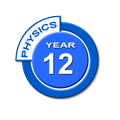
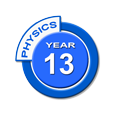
Physics Year 12 / NCEA Level 2
Workbooks
This subject is supported by the following write-on workbooks:-
AS 2.3 (91170) Waves
96 pages of coloured diagrams, graded questions and answers, NCEA style questions. -
AS 2.4 (91171) Mechanics
92 pages of coloured diagrams, graded questions and answers, NCEA style questions. -
AS 2.5 (91172) Nuclear Physics
27 pages of coloured diagrams, graded questions and answers, NCEA style questions. -
AS 2.6 (91173) Electricity and Electromagnetism
93 pages of coloured diagrams, graded questions and answers, NCEA style questions.
eLearning
44 modules = approximately 200 pages of information, pictures and diagrams = 1760 questions and explanations.-
Revision (Year 12 work)
-
Topic Contents
- Analyse Data Graphically.
- Atoms and Radioactivity.
- Electricity: Static and DC.
- Electromagnetism.
- Force.
- Light.
- Measurement.
- Momentum and Energy.
- Motion.
- Waves.
Achievement Standards Contents
-
AS 2.1 (90252) Take measurements of physical quantities and analyse data graphically to determine a relationship (Expiring 2012)
5 modules cover Analysing Graphs, Drawing Line Graphs, Measurement and Calculation, Measurement and Metrics, Vectors and Scalars. -
AS 2.3 (91170) Demonstrate understanding of waves
10 modules cover electromagnetic waves, reflection and refraction of light and mirrors, superposition of pulses. -
AS 2.4 (91171) Demonstrate understanding of mechanics
12 modules cover topics such as Newton's First and Second Laws, acceleration, motion, power, work and energy etc. -
AS 2.5 (91172) Demonstrate understanding of atomic and nuclear physics
2 modules cover the atom and radioactive decay. -
AS 2.6 (91173) Demonstrate understanding of electricity and electromagnetism
10 modules cover topics such as electrical and magnetic field devices, circuits, electromagnetic induction etc.
Physics Year 13 / NCEA Level 3
Workbooks
This subject is supported by the following write-on workbooks:-
AS 3.3 (90520) Wave Systems (to be completed Term 3)
96 pages of coloured diagrams, graded questions and answers, NCEA style questions. -
AS 3.4 (90521) Mechanical Systems
102 pages of coloured diagrams, graded questions and answers, NCEA style questions. -
AS 3.5 (90522) Modern Physics
66 pages of coloured diagrams, graded questions and answers, NCEA style questions. -
AS 3.6 (90523) Electrical Systems
136 pages of coloured diagrams, graded questions and answers, NCEA style questions.
27 pages of coloured diagrams, graded questions and answers, NCEA style questions.
eLearning
44 modules = approximately 200 pages of information, pictures and diagrams = 1760 questions and explanations.-
Revision (Year 12 work)
-
Topic Contents
- AC Circuits.
- Atoms, Photons & Nuclei.
- Circular & Rotational Motion.
- DC Circuits and Capacitance.
- Electromagnetic Induction.
- Practical Investigations and Mathematical Relationships.
- Simple Harmonic Motion.
- Translational Motion.
- Waves, Interference & Diffraction.
Achievement Standards Contents
-
AS 3.1 (90774) Carry out a practical investigation with guidance, that leads to a mathematical relationship
3 modules covering experimental error, graphical experimental error and empirical mathematical relationships. -
AS 3.3 (90520): Demonstrate understanding of wave systems
6 modules covering waves and standing waves, the Doppler Effect. -
AS 3.4 (90521) Demonstrate understanding of mechanical systems
14 modules covering translation motion, circular and rotational motion and simple harmonic motion. -
AS 3.5 (90522) Demonstrate understanding of atoms, photons & nuclei
7 modules covering atomic line spectra, Bohr's model of the hydrogen atom, mass energy conservation, quantum theory etc. -
AS 3.6 (90523) Demonstrate understanding of electrical systems
15 modules covering DC circuits and capacitance, electromagnetic induction and AC circuits etc.